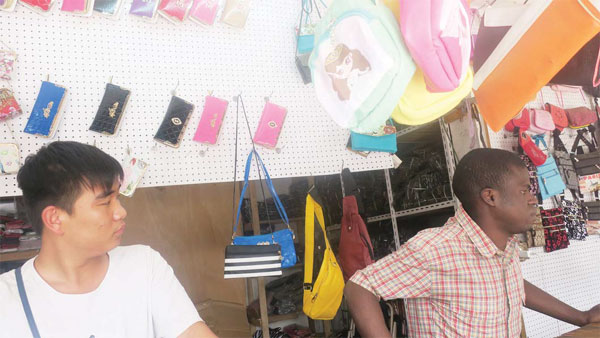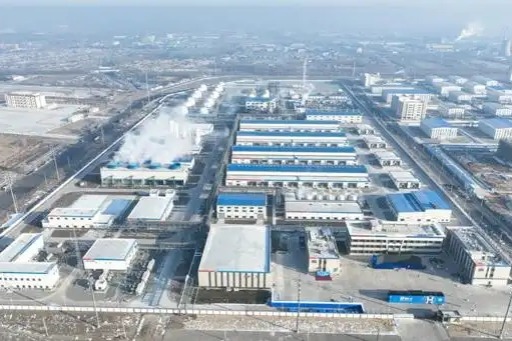Chinatown trades in more than goods

Harmonious relationships in small enterprises inspire a younger generation to try their hand at business
A harmonious business relationship has developed between Chinese and Africans in a bustling street in Dakar, Senegal. Boulevard du Centenaire, in the downtown area, has become known as Chinatown owing to the large concentration of businesses selling Chinese products, which are becoming increasingly popular with consumers.
According to government statistics, at least 3,000 Chinese people live in the West African port city. Some are technical staff working on large infrastructure projects commissioned by the government. But the majority have settled in the city and established businesses ranging from retail outlets to restaurants.
| Boulevard du Centenaire in Dakar, Senegal, has developed into a business center for an abundance of Chinese products. Lucie Morangi / China Daily |
Bale Elimane Guaeye, head of the investment monitoring department of Apix, an investment promotion and major projects agency, says Chinese-owned establishments have multiplied in recent years and supply local demand for products such as household items, clothing and shoes. This has not only met the needs of local residents but also stirred entrepreneurial ambitions among young people.
"Many locals buy goods in bulk and sell them in rural areas," he says.
Senegal, a largely French-speaking country, has a population of more than 15 million. Seventy percent is made up of a young people aged from 15 to 45. The official unemployment rate is 20 percent.
Increasing competition posed by the Chinese has inspired some young people to set up businesses.
Shekh Diop runs El Hadji Saliou Kante, a shop that sells women's accessories and shoes in Chinatown. He is employed by his older brother, who travels to Guangzhou twice a month to buy products.
"We have specialized in women's shoes and handbags. Very few shops here sell these particular products so it gives us a competitive edge," he says.
Before running the shop, the brothers sold Chinese products door-to-door. For several years they would buy products from the Chinese shops and hawk them on the streets. Unlike the shopkeepers, they would take the products to the customers.
"We were able to save and access loans from the local micro-finance bank. But because we were unfamiliar with the Chinese market and capital we didn't have enough to leverage on quantity. So we pooled resources with other youths in this neighborhood," says Diop.
With enough capital, they were able to buy out their grandfather, whose business was struggling under growing competition on the street. The zeal and acumen of the two brothers has made them resilient and agile.
"While our Chinese competitors go all the way to Yiwu, a city in Zhejiang Province in China, because they are more familiar with the vast Asian market, we explore all our options in Guangzhou to make sure that our products are unique. We also know the locals' tastes and preferences, unlike them," says Diop.

He does not agree with claims of rivalry among these two communities. Instead, he says Africans need only use their home advantage to rise above the competition. He also says that pooling resources with other local youths has enabled them to exchange ideas on new trends, expand their rural supply chains and strengthen their market position. These are advantages the Chinese business community cannot easily draw on.
"What African youths want are employment opportunities. We are in a globalized world that cannot ring fence markets at a time when consumers are becoming more aware of the competitive prices and technologies that are available. However, we need to know our comparative advantage and exploit it."
Aiming Hui, a Chinese businesswoman hailing from Hunan province, has co-owned a shop with her brother for six years now. She says most of her wares are purchased in bulk.
"Our peak months are during the religious festive seasons. But we have our supplies shipped in monthly because the demand is growing."
She has five employees who are Senegalese. The hand cart pushers who help transport goods from the warehouses are from the neighboring Guinea, who also speak French.
"There is no language barrier when you share a common purpose. We all want to better our lives so we find a way to work through communication barriers," says the graduate from Jiaotong University in Shanghai, who majored in English.
She says the business community in the city lives in harmony.
"This is also a community that is strongly cultured and hence still prefers locally-manufactured African wares. Clothes from China face competition despite our competitive prices," she observes.
Senegal's geographical location and political stability make the country attractive to foreign trade partners looking for new, reliable markets for manufactured goods.
lucymorangi@chinadaily.co.cn
(China Daily Africa Weekly 03/31/2017 page28)
Today's Top News
- Experts: Lai not freedom fighter, but a pawn of the West
- Hainan evolves as gateway to global markets
- Opening up a new bridge between China and world
- Tour gives China-Arab strategic trust a boost
- China accelerates push for autonomous driving
- Opening of new gateway can help foster global economic and trade cooperation































